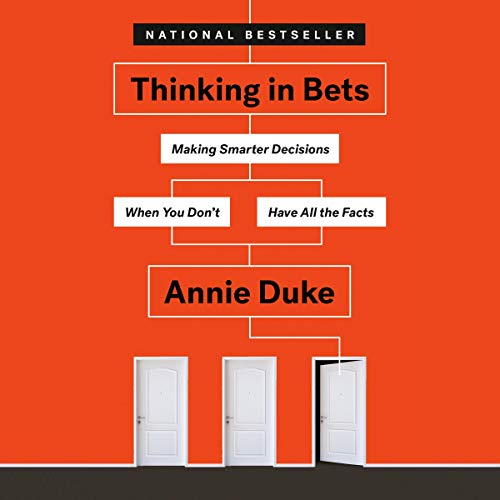Thinking in Bets: Making Smarter Decisions When You Don’t Have All the Facts.
By Annie Duke
If the NFL created a fan-based award at Pro Football’s Hall of Fame in Canton, Ohio, I would nominate this author! Annie Duke’s picture would be placed in the Seattle Seahawks’ exhibit hall. She is a loyal, passionate, forgiving, smart, and insightful Sea Hawks fan, which is well-documented in her excellent book. I came away convinced that Pete Carroll is one of the greatest coaches of all time, and that’s saying a lot from a Packer fan. She argues that, with clear thinking and complete analyses, he made the correct decision in the 2015 Superbowl. While his infamous decision cost the Seahawks the Super Bowl, according to the author, he made the appropriate decision to have his quarterback throw rather than a running play. While we might judge a decision by its results, his decision was based on shrewd probabilities.
The topics she covers are emotional, complicated, and subjective. She uses the tactics employed in the game of poker as examples of how people can make good decisions in our regular lives. Her primary lesson is to focus on the process of deciding, not only on the result. Process not product.
I read a lot of personal finance and spiritual books. Her positions on uncertainty vs. certainty, and luck vs. skill, rational and irrational, combined with our biases, and the proper definition of confidence are spot on. For example, certainty does not exist except for the fact that we are born, must pay taxes, and someday must face death. The past has all the answers to show better decisions but by then it’s too late. So, using past information and experience is a small part of decision making.
Duke talks about luck for good reason. Being lucky happens more than we like to admit, but skill has a place too. Humans believe that it was due to our skill when the decision was great, and it was luck when the decision was not. Knowing the complex interaction between luck and skill will help us learn from negative results to make better decisions in the future. BTW, there is nothing inherently wrong or insulting if being lucky outperformed being skillful. Being lucky works to our benefit too, but we need to be aware of the relationship with skill.
Seeking another person’s or group’s point of view of your work seems to be so straight forward and filled with common sense. I have read enough success books where people say they hire people or consult with others who are more experienced, smarter, and more knowledgeable than we are. Duh! Of course.
The author practiced what she preaches and sought out and LISTENED to everything offered, positive and negative, by more experienced poker colleagues. When I was a novice teacher, I sought and watched experienced teachers in their classrooms and attended their classroom management workshops. When I had personal problems, I sought therapy. When I lost my spouse of 40 years, I sought a bereavement group. When I needed help with my investment decisions, I read many books and talked to knowledgeable friends and experts at conferences.
When I wrote my two books and my blog, I took many writing classes, workshops, and attended critique groups. I believe the author would agree that a critique group serves as one of the best methods to mitigate the effects of unclear, unfocused, and uninteresting writing. It can be a painful process listening to one’s biases, conflicts, and irrationality discussed by other writers in a critique group, but it promotes one’s writing to become more precise.
When I was in high school football, I often sat on the bench. But instead of feeling sorry for myself, I learned to love the practice sessions because they offered my main opportunities to play. When I made investing mistakes, I used the information from my studies and my experience to straighten out myself and my portfolio, and eventually became a successful investor.
For all these reasons, Thinking in Bets: Making Smarter Decisions When You Don’t Have All the Facts by Annie Duke earned my five-star rating. However, I have two minor quibbles. First, is with truth and truth finders. Truth is not something outside of ourselves. I believe truth is in the eye of the beholder. The author made it sound like that finding the “truth” is the ultimate goal before making the decision.
Secondly, I think championship poker players would benefit from an intense and profound memory of the cards dealt. That’s significant evidence to also consider for deciding to fold or bet. Of course, in the final analyses, players never know what is in their opponents’ hands, but knowing what was discarded is important. Perhaps the author left out this basic skill because knowing what the opponents don’t have is meaningless. Duke’s primary point throughout the book is how to minimize uncertainty. Knowing what was discarded by other players does not eliminate the uncertainty of not knowing what they have. In poker, as in real life, uncertainty is everywhere. Whether decisions about who we love, which career, where we live, or how we invest and manage our finances, and it is in our best interests to drink a cup of coffee with uncertainty.


